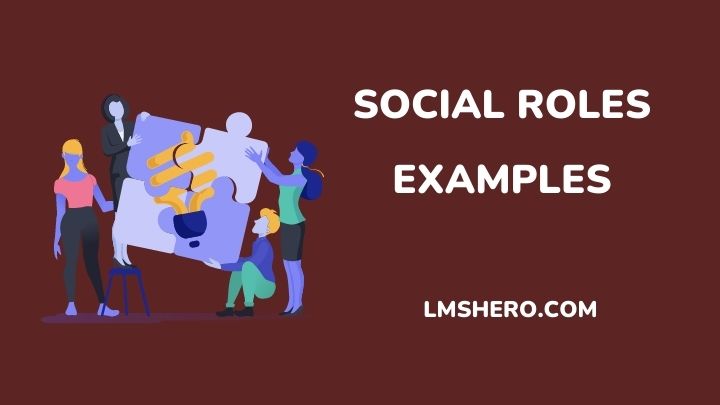Wondering what are social roles examples in society?
Social roles are a set of prescribed behaviors that an individual is expected to display in order to maintain their identity and relationships within a social group.
Social roles range from being a husband to working as a construction worker to being someone’s child and more. Depending on the situation, people often play various social roles in their daily lives.
However, social roles can vary depending on the culture or social group. They can also be thought of as a set of rules that people have to follow to be accepted by others and preserve a certain status quo.
This article explores some common social roles we have in society.
Social roles examples
1. Leader

Leaders exist in every organized community. The social role of such individuals is to organize, establish rules, and exercise authority.
A leader is an experienced community or organizational member with exceptional leadership skills. They are required to help ensure a clear social hierarchy and decision-making chain.
For example, a community may be organized into a hierarchy with only one leader (such as a president or prime minister), or it may be organized into a group of leaders (such as a board of CEOs).
However, among groups of friends, there is often no leader, but the leader is usually the friend who is the most confident, charismatic, assertive, or loved.
2. Follower
There cannot be leaders without followers, and while followers are not as important to society as leaders, they also play significant social roles such as listening, observing, and learning.
Followers acknowledge the leader’s authority, follow their direction, and complete tasks set by the leader. For instance, a political party needs both a leader and supporters who believe in the party’s ideas and will organize, rally, and vote for the leader.
3. Parent
Being a parent is one of the most significant examples of social roles. They are their children’s primary instructors.
They transmit morals, values, and customs to the next generation so that culture can be passed down through generations.
4. Student
The major social role of every student is to study, attend class, and learn. In fact, some communities identify and protect this role.
For example, the government of Australia gives students a monthly stipend to study without having to work.
This demonstrates how society valued the importance of this function. Students are required because they will become physicians, lawyers, and other working professionals who will keep society running.
5. Son/Daughter
The son or daughter role is an extension of the parenting role. They are expected to interact with society in particular ways and have a protected standing in society.
Children, for instance, are not permitted to work and are required to attend school. They must also honor and cherish their parents.
6. Spouse
It is required of a spouse to support and care for their chosen significant other or partner. This social role is valued and also enjoys a unique prestige.
In certain societies, couples receive financial benefits, such as the ability to report a portion of their income on separate tax returns.
7. Volunteer
A volunteer is someone who offers their services to society for free. Volunteers comply with the coordinator to add value to society
They are essential to every community in many ways, and they play a crucial role in helping those in need, especially during crises.
Although volunteers do not get paid, they can receive both private and public support, as a token of gratitude.
For example, the government can donate firemen volunteers helmets, or a local coffee shop may provide the volunteer with complimentary coffee.
8. Teacher
Teachers are responsible for transferring knowledge and skills to the following generation. Their core social roles are to educate, manage classroom activities, and provide an effective academic environment to their students.
However, the role of teachers has evolved over the years, as they are now required to teach students how to think logically and critically, as opposed to just imparting academic knowledge.
9. Medical practicional
Being a medical practitioner such as a doctor, surgeon, nurse, etc. is also one of the most important examples of social roles.
They have comprehensive knowledge of health-related issues and even keep us alive. Their role is to provide emergency care, diagnose illnesses, treat the sick, and give health-related advice.
A society without doctors would result in a decline in life expectancy and quality of life. As a result, doctors hold a special role. And due to their unique standing, doctors are often well-compensated and highly regarded in their communities.
10. Journalist
Journalists, like historians, are record keepers. They record news, interpret current events, and compose editorials. However, journalists often break news and explore current events of interest to their readers.
Journalists are also highly influential members of society. They are sometimes so effective at revealing the truth and holding the powerful accountable that they are wrongly jailed and sometimes imprisoned.
11. Politician
Elected politicians determine how society works, and they are responsible for representing their community. Politicians make laws, engage constituents, and advocate for the needs of the residents.
In western democracies, all groups are represented by parliamentarians who pass laws on their behalf.
Hence, if you stay in a conservative town, you can expect your representative to vote in accordance with those ideals. Just the same holds for liberal neighborhoods.
Several elected officials, such as your governor, local representative, and senator, can also represent you directly.
12. Officer of the law
They are authoritative individuals responsible for making moral decisions, enforcing the law, and providing emergency care for people in the community.
As a result, they have access to privileges not available to the general public, such as the power to make arrests and conduct searches at will.
In other circumstances, another individual may assume the role of authority figure. In the workplace, the boss is in charge. At home, it may be a parent.
FAQs
Why do social roles matter?
As human beings, we need norms to guide and direct our behavior in society, hence, a need for social roles.
How can you violate your social role?
You can violate your social role by not playing your part appropriately.
Why is it important to follow these social roles?
It is important to know your value and purpose in life which will guide your career path and be a useful member of society.
How do social roles change in society?
Social roles can change as a result of time and societal pressure.
Conclusion
In society, there are numerous roles, and most of these social roles come with different roles, responsibilities, and expectations that must be met.
Hence, it is important to play our roles to facilitate the smooth operation of our society.
I hope you found this article interesting. You can also read to know your role in your community and how to make a change.
Thanks for reading.







